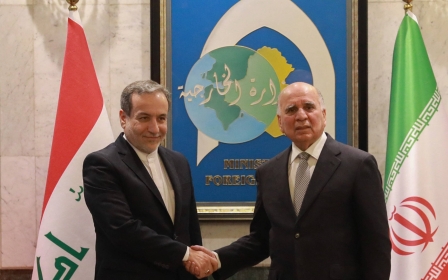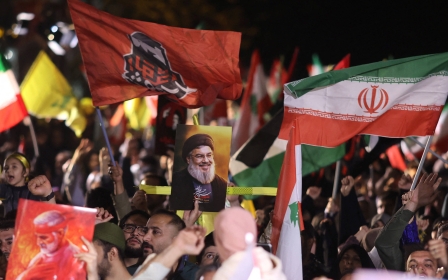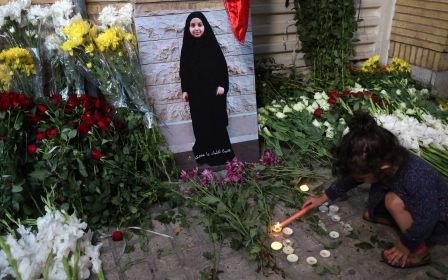Iranian press review: China and Russia criticised over response to Israeli strikes

Frustration as China and Russia fail to condemn Israeli attacks
China and Russia's response to Israel's attacks on Iran has drawn widespread criticism, with many deeming the reactions insufficient and delayed.
The Ham-Mihan daily emphasised that given the extensive promotion of strategic relations between Tehran, Moscow and Beijing in recent years, there was an expectation that Russia and China would officially condemn the attacks on Iran.
The newspaper wrote: "Three days passed after the Israeli military attack on sites in three Iranian provinces before China’s foreign ministry responded. The Russian foreign ministry spokesperson also commented on the attack only hours afterwards. In the end, neither Beijing nor Moscow condemned Israel's actions."
The daily continued to criticise the stances of these two countries, comparing them to some European nations that have tense relations with Iran.
New MEE newsletter: Jerusalem Dispatch
Sign up to get the latest insights and analysis on Israel-Palestine, alongside Turkey Unpacked and other MEE newsletters
As western sanctions against Iran have increased in recent years, Tehran has strengthened economic ties with Moscow and Beijing, with one key outcome being the sale of cheap oil to China.
However, the expansion of these political ties has consistently faced criticism within Iran and discontent has intensified following recent direct conflicts between Iran and Israel.
Calls for direct military action against Israel
A newspaper affiliated with Iran’s so-called “hardliners” has called for direct military action against Israel, arguing such attacks are essential for ensuring regional stability.
In an article titled "Killing the Dog", the Agaah daily emphasised the need to intensify military confrontations with Israel, saying: "Attacks on the interests of the Zionist regime worldwide guarantee the security of the region."
The report featured images of Israel’s political and military leaders alongside suggested targets, including military and economic centres.
This is not the first instance of Agaah has advocated direct action against Israel. Last month, the daily released a list of sites that could potentially be targeted by Hezbollah’s missiles and drones. The list included food factories, power facilities, technology plants and chemical production sites.
Moreover, the Dimona nuclear plant was identified as a target for Hezbollah, reportedly within range of Iran’s Fateh-110 missiles.
Ex-legislator: Iran’s diplomacy hampered by internal conflicts
The former head of the Iranian parliament's National Security and Foreign Policy Commission has criticised the government's handling of “extremist” groups within the country, saying they are undermining diplomatic efforts.
In an op-ed, Hashmatullah Falahat Pishe argued that the failure to unify domestic political forces has led to setbacks in the nation’s foreign policy.
“Diplomacy is accepted and trusted globally when it reflects a unified and strong voice within a country. Therefore, the key obstacles to diplomacy here are internal,” he wrote, adding: "Mr Pezeshkian’s government must address these issues first."
Falahat Pishe also mentioned Foreign Minister Abbas Araghchi’s recent visits to nine Middle Eastern countries, stressing that the activities of extremist groups in Iran have undermined these diplomatic efforts.
“This shows the government has not yet resolved its internal challenges with extremist factions. The government must first prove its ability to address foreign policy issues internally. Only then can diplomacy succeed,” he concluded.
Afghan advisor’s speech sparks backlash
The invitation of Farugh Azam, an advisor to Afghanistan’s Ministry of Energy and Water, to deliver a speech and receive praise has sparked outrage in Iran. Azam is seen as a key advocate of restricting water flow from the Helmand River to Iran.
The Helmand River originates in Afghanistan and feeds into Lake Hamoun in Iran, which has been drying up in recent years.
Hossein Farzin, a water diplomacy expert, was among the Iranian specialists who viewed Azam’s invitation as detrimental to Iran's national interests.
Farzin argued that “giving a platform to Azam is a risky move and considers the praise of this Afghan official detrimental to the country. He is one of the promoters of constructing more dams in Afghanistan, which would further damage Iran’s environment”.
The issue of water rights for Lake Hamoun has been a major point of contention between Iran and Afghanistan, particularly since the Taliban’s return to power.
Middle East Eye delivers independent and unrivalled coverage and analysis of the Middle East, North Africa and beyond. To learn more about republishing this content and the associated fees, please fill out this form. More about MEE can be found here.




